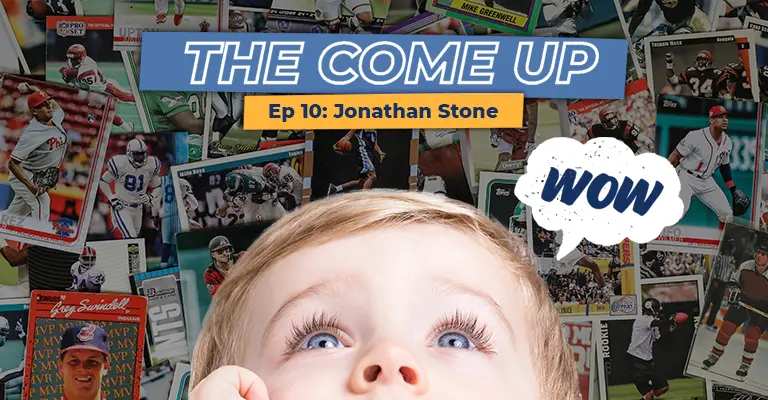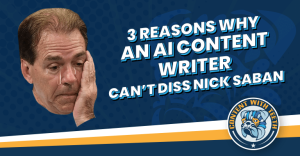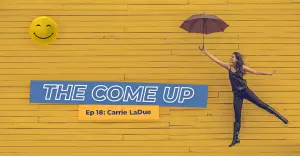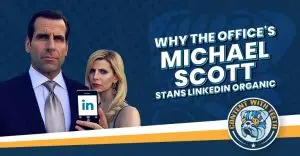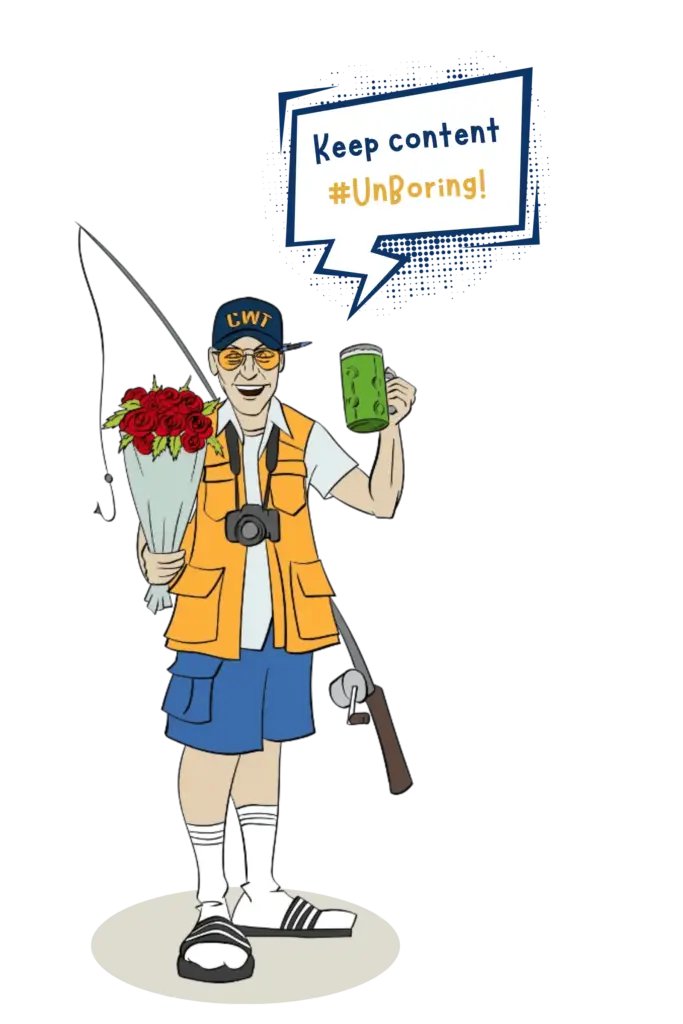Kids, be prepared for WOW.
Be prepared to be amazed.
Why?
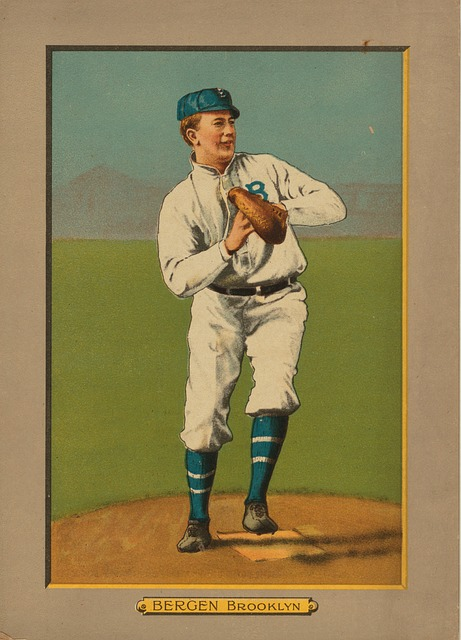
Because Jonathan Stone, Owner of Blue Breaks LLC, a new sports card collecting and memorabilia store in Venice, Florida, makes an appearance on Episode 10 of The Come Up.
Jonathan is a card collector and former big league sports referee and is Scrappy’s guest on Content with Teeth’s video podcast chronicling dynamic entrepreneurs in Southwest Florida and beyond.
The Come Up Episode 10 Highlights
Sorry eBay: Learn why Jonathan thinks there is no such thing as competition in the sports card world and discover the Blue Breaks niche. It involves thousands of sports cards at a kid-friendly price of a penny a piece.
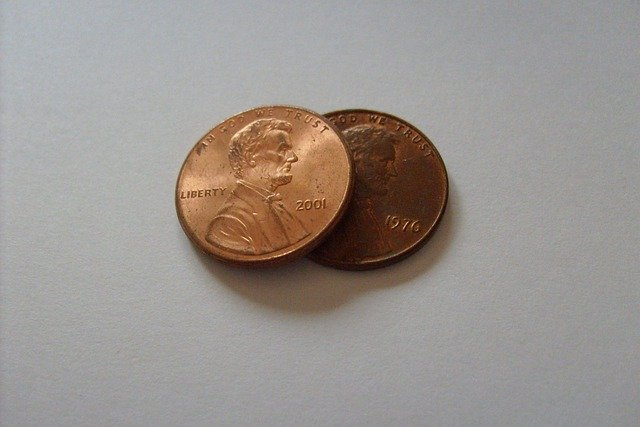
The Big Racket: Jonathan details his fascinating background, including umpiring at Wimbledon to the likes of Nadal, Federer and other legends.

Retail Therapy: If you’re a card-collecting maniac, learn why you should visit a store and not just slum it out on eBay or a trade show for the best selection.
Uh, Teacher, Why Does My Mint Pete Rose Have a C? If you’ve got some old baseball cards stashed away or are a big-time collector, learn the details of sports card grading. Jonathan sheds light on a sometimes arcane process. Don’t miss this section if you’re interested in the value of your collection whether it’s hockey cards or non sports cards.
Catch other key nuggets in Episode 10 of The Come Up like how his wife thinks he’s crazy and how Jonathan’s inspiration is his 9-month newborn and any smiling kid hunting for a deal.
About Jonathan Stone & Content with Teeth
For UnBoring Content like The Come Up, contact Content with Teeth HERE. Find out more about Blue Breaks LLC HERE.
The Come Up Episode 10 Video Transcript
Scrappy:
What up? What up? What up? What up? What up? I’m Scrappy. This is The Come Up, featuring Southwest Florida entrepreneurs. They’re innovators, risk takers and big picture thinkers.
Today, our guest is really cool, really cool. I’m looking forward to this, ’cause I’m a baseball collector myself.
It is Jonathan from Blue Breaks in Venice Beach. He’s got a great store over there. If you want to be our next guest, make sure to check us out at Hey Scrappy on Instagram.
Blue Breaks, tell us about your store. How long you’ve been in business, Jonathan?
Jonathan Stone:
Hey, Scrappy. Well, we’ve been in business three weeks now. We opened the doors three weeks ago. We’ve been primarily online until then. But yeah, no, me, the wife and the nine month old baby decided it was time to take some risks.
We sold our home, moved to the area we’re in now. We’re actually staying with friends at the moment yet. We sold our home and put all of our money into opening a store because we just felt that there’s a space in the market for what we do.
Scrappy:
Okay. So in Venice specifically, do you have competition?
Jonathan Stone:
There’s some other stores in Venice, but I don’t think there’s competition in the sports cards well, because it’s not like McDonald’s, Wendy that all have a burger. They have the same burger.
You can go into every sports card store in the country. Every single store has different cards, has a different product. Not only that, even if they have the same product, when you open a box of sports cards, the cards inside are different in every single box.
So, no, I don’t think there is such a thing as competition in the sports card world. There’s other people that sell sports cards. There’s other people that do similar things.
It’s funny. I was talking to a customer a little while ago. As a collector, you should never only buy what you collect from one store or one person, because every person has a different card, has different types of cards, has different items that you want to collect. This is no different.
Scrappy:
You say you’re different from everybody else. What’s your niche?
Jonathan Stone:
In the store, as well as obviously selling sports cards, we have single sports cards from one penny. So, you can come in the store right now, and we have 30,000 cards that are a penny each, for sale in store right now.
As well as that, we have trade nights. We also do birthday parties for the kids as well.
Scrappy:
Oh, that’s fun. That’s fun. So you’ve been in business for only three weeks. Where do you get all your inventory?
Jonathan Stone:
We do a lot of shopping online. We have distributors. We have contacts within Panini and Topps and things like that as well, that we utilize.
We get as much as we can, from as many different sources, so that our customers come in and have a great weekend.
Scrappy:
Interesting. Interesting. As an entrepreneur, you’re staying at your friend’s house, you’ve put all your money into this. It’s a leap of faith.
Is it something you’re really passionate about or something you see as a business opportunity or both?
Jonathan Stone:
I’ve worked in sport my entire life. I spent 10 years as a tennis umpire. I worked tennis matches at the very top level. I’ve worked Wimbledon. I’ve worked tournaments all over the world. Roger Federer, Rafael Nadal.
I’ve also worked soccer professionally, in multiple countries. And I’ve actually spent two years in baseball. I worked in Independent Professional Baseball league last year. I also do call-up games for the minor leagues.
So as well as that, to me as a collector of sports cards, it’s about filling a gap in the market, where other collectors can actually get their hands on the products they want from somebody who cares.
Scrappy:
Okay. Does your wife think you’re crazy for doing this?
Jonathan Stone:
My wife thought I was crazy before this. This just puts the nail in the coffin. I was crazy long before this.
Scrappy:
Jonathan, I’ve bought cards on eBay. I’ve gone to trade shows. I’ve been to shops. Why should I go to a shop versus eBay or a trade show?
Jonathan Stone:
Because you can come in store. You can handle our cards. You can look at it. You can get the advice you need.
We do products where you can clean your cards in store. We also do products where you can store your cards in the best condition.
Not only that, we submit to graders. We submit cards to PSA. You can actually have a good time in here.
We’ve had a lot of people in here at the weekend. We had people watching the England versus Germany European Soccer final game.
We had people in here buying supplies. We had kids in here. We had a David Becker autographed card come out of a box. We had a Steph Curry card come out of the box.
Scrappy:
Oh, wow. Wow.
Jonathan Stone:
We had a Juan DeFranco card come out of a box yesterday as well. So, we’ve had lots of cards come out over the last few days. You don’t get those experiences anywhere else because at home, you’re on your own. You’re opening cards.
If you go to a show, you’re probably buying the cards. You don’t want to open them at the show ’cause you want them to be protected.
But here you can come in, grab the cards, and we’ll give you the protection you need, so that your cards go home in the same condition they come out of that box in.
Scrappy:
The experience, for sure. That’s really interesting. That’s definitely a differential advantage.
Now, you mentioned kids. What percentage of your customers, at least in the first three weeks, are children versus some avid hardcore collector?
Jonathan Stone:
We have, obviously adults that are regaining their childhood through this. We also have collectors that come in with their kids as well.
It’s funny. A little while ago I had the gentleman come in. Him and his daughter actually collect. They’ve been a great inspiration for me and my wife, because to see them bonding over collecting cards, a guy who did this when he was a child and now his almost teenage daughter, getting into it, coming in and raiding up any boxes for her is just, it’s just an amazing thing, watching them bond.
So I think you’re probably looking at a 50/50 split because most of the kids bring their parents with them.
We do mimosas on a Sunday for the baseball moms, just to keep them happy as well. So, we have a few adults come in, but we do have a lot of kids.
Scrappy:
Are you a sucker for a kid with a smile, that wants a good deal?
Jonathan Stone:
When you have a nine month old baby, you’re a sucker for any kid with a smile. Sucker for any kid with a smile.
Scrappy:
How do you make the transition from being an umpire and a referee and being a sports advocate in that regard, to actually selling your wares, from a baseball card perspective?
Jonathan Stone:
It’s been an interesting transition. This time of year, I’m used to… Normally, I’m away in the summer on a baseball field. It’s been hard this year, being at home. But I think life has changed for me.
Now having our Kalimar baby, it’s giving him something that when he’s two, three, four, five, his interest will pique. He can help out in the shop. It keeps him busy.
But not only that. It’s a family business, that hopefully he’ll carry on in years to come.
Scrappy:
That’s awesome. I can tell just by your personality that you’re breeding something special over there, Jonathan. I can totally feel that.
You mentioned graded. Now, it’s really frustrating to me as a baseball card collector, that I got to send out graded cards. Can you explain the process to our audience?
Jonathan Stone:
Cards are worth different value, depending on their condition. In a sense, in the grading world, you’re grading your card from one to 10, 10 being the best, one being the worst.
Each of those grades, depending on the company and the grade you get, are worth a different value.
So just because it comes fresh out of the box does not mean it’s a 10 out 10 perfect condition card. Errors happen in printing, so it might be slightly off center.
We’ve all had those days where we’re fed up with that little bit of black ink crossing through a couple of letters on the printer. That happens in the card world. So, all of those sort of things affect it.
You can come to us. We’ll clean the card for you. We will send it off to PSA, and then that card comes back with a grade on it.
A grade is no better than a referee or an umpire. It’s just one person you’re, paying to give you an independent opinion on that card.
Scrappy:
How much does it cost?
Jonathan Stone:
It varies from $18 into the hundreds, depending on the value of your card. The annoying thing with grading and it annoys me as a store and as a collector, is the grading cost is dependent upon the value of the card.
So if you turn around and bring in a card that’s worth 30, $40, you might get away with an 18 to $23 charge to have that graded.
But if it’s worth 50, 60, $70,000, then we’re going to start talking thousands of dollars for the exact same process. That’s where it’s frustrating as a collector.
But we have to remember, when all these cards are being handed around and they do have these high values, there’s things like, insurance has to be taken into consideration, because that company is assuming the risk and liability of damaging that card that’s worth thousands of dollars.
Scrappy:
For sure. For sure. I have a 1980 Topps baseball card set. Ricky Henderson’s in there as a rookie. What are the chances that if I get it graded, it’s going to come out spectacular and make me a couple dollars?
Jonathan Stone:
I think there’s a chance with any card, it comes out spectacular. It’s going to depend on how you’ve kept it over the years, making sure it’s in as good a condition as possible.
Not only that, the value of cards changes all the time. David Ortiz got entered into the Hall of Fame this week. The value of his cards will change, based on that.
Players that get called up from the minor leagues into the majors, their card value will change on that.
Touch wood it never happens, when players pass away, their value changes on those cards again. To get the maximum revenue out of your card, if you’re wanting to sell it, is about doing it at the right time.
Scrappy:
Jonathan, it’s so frustrating, because I have probably a hundred cards that I look at, that have so much potential. A nice Pete Rose, a Yaz. I got a 1961 Yaz rookie card. I have all these different cards, but it would cost a fortune for me to be grading them.
Jonathan Stone:
Oh, a hundred percent. I feel your pain. We have about 65,000 cards on the shop floor right now, that if I could only afford to do that, I would.
A lot of collectors want their card in the original condition. They don’t necessarily want it graded.
We talk about when you’re watching again, the baseball purist. There is still plenty of baseball purists out in the card collector world that want it in that original condition.
So, there is pluses and minuses with grading. It’s not always the best idea to throw your money at grading. Sometimes, you know what? It’s best you just love what we have.
Scrappy:
Okay. I have my 1961 Yaz rookie card. It’s in plastic. I’ve kept really good care of it. My dad gave it to me as a gift a long time ago. I still have it. Is it better for me to go on eBay and try to sell it or bring it to your store?
Jonathan Stone:
As a generalization, going on eBay, you’re probably going to get the market value for that card. But don’t forget, you’re going to have a 13% fee, which will be a charge from eBay for selling with them.
So let’s say a card sells for a thousand dollars. You’re going to lose 130 straight away. So, now we’re down to 870. All right?
So you come to me. I’m probably going to offer you 750, $800 for that card. So you’re going to say, “Well, why would I sell to you instead of eBay?”
Remember, when that person gets that card, if they don’t like it, they can return it, and you’ve got to return that money.
When it comes to me, that’s money in your hand. You’re good to go. Let me deal with the problem. Let me deal with the customers because just like anything else, if you mail it out and it gets damaged in the mail, you’ve got to deal with USPS, when it comes to insurance and things like that. I can deal with all of those problems for you.
Scrappy:
I think it’s fascinating that you can just reel off 750, 800, off the top of your head, based on a year and a player and a team. That’s amazing to me.
So in that regard too, then you know how much you can get out of it, selling it to somebody else. So that’s all in your head?
Jonathan Stone:
A hundred percent. So when customers come in to sell to us, one of the things that we believe makes us different from some of the competition is, we will give you a price that we believe is fair.
But not only that, I’m going to tell you the price sticker that I’m going to put on that product on my shelf.
So if I come in and think that card’s worth a hundred dollars, I’m going to tell you straight up, “I’m going to sell this card in store for a hundred dollars.” I will offer you $70 in cash and $85 in store credit, which you can use in the store.
But by being transparent, you know that when you come in, in two, three, four weeks time, you see the price. Oh, you know what? He’s done exactly what he said he’s going to do. So, perhaps this is the guy we can trust.
Rather than you look at the stores all over the country. If you go and sell a card to a store and they give you 50 bucks, and you go in three weeks later and you see your card for $400, is that a store you’re going to keep going back to?
Scrappy:
Right. Right. That’s so smart. That’s really smart. If I get that transparency from a company or a card shop, it’s going to definitely make me want to go there on a regular basis.
That’s really, really smart because we have an attitude as baseball card collectors and avid fans, that we’re going to get screwed over, unfortunately.
Jonathan Stone:
Yeah. I think for me, a lot of stores, all up and down the country, when they go from being… They’re run by collectors. Everybody that opens a card store is generally a collector. We have an interest in this.
But when they start transitioning from that to just a store owner that wants to make money, then we lose the concept of why we opened.
But no, I’m a collector. I know what my card is worth. If I know my card sells on eBay for a hundred dollars or $200, and this person in front of me is offering me 30 or 40, why would I carry on doing business?
I know that the card I’m buying from them, they’re making way too much money on. So look, let’s be transparent. I’ll tell you what I’m going to price it out for in store. I’ll tell you what I think it’s worth, but I’m going to also offer you what I think is a fair price.
If you think it’s fair, you take it. If you don’t and you want to go to eBay, there’s zero hard feelings about that. I think we need to be aware of that, as dealers.
Scrappy:
You mentioned earlier, boxes. Is it better to keep a box intact or to cherry pick out six cards that are valuable?
Jonathan Stone:
No. I think, let’s look at 1986 Fleer basketball, the Michael Jordan rookie cards. The individual packs out of those, I think I saw on eBay, some were selling for $1,500 a pack.
Scrappy:
Wow.
Jonathan Stone:
There’s 40 packs in a box. So, we’re talking $60,000 in a box. That doesn’t happen with every product. The product value’s dependent on the rookie class or the class that’s in that product, each and every year.
But generally, do you know what? Buying some boxes and keeping a hold of them, it’s rare a box will ever go down in value.
Scrappy:
Everybody wants the rookie card. That’s for sure.
Jonathan Stone:
Oh, yeah.
Scrappy:
Kyle Trask, the football player, the quarterback for the Florida Gators, I’m a Florida Gator, I bought a bunch of his cards on speculation.
Of course, I bought Kyle Pitts. I bought a bunch of Kyle Pitts. I bought like 20 rookie cards from him. I don’t really know what I’m doing.
I buy these cards randomly. And then all of a sudden, my friend who knows baseball cards better than me says, “Well, these are still not worth anything because they’re not autographed. They’re not the high end brand.”
When we want to get a rookie card on speculation, somebody in college, that’s going into the pros the following year, how do we buy?
Jonathan Stone:
Let’s all remember one thing. Tom Brady was picked in what, the seventh round? Those were cards at the time, that me and you could’ve probably bought on the equivalent of eBay back then, for 99 cents.
That’s not now. You’ve got to collect who you want to collect, who you enjoy and who you love.
For me every year, I’ll look at a product Bowman draft in baseball. I’ll pick some two or three random names that went maybe in the fifth, sixth, seventh round. I’ll pick two or three. I’ll invest heavily in those cards at 25 cents, 50 cents, a dollar and buy as many of those as I can. The cheaper you buy a card, the less money you are going to lose. It’s like shares.
Scrappy:
Sure. Sure.
Jonathan Stone:
So if I buy a hundred of these cards for 25 cents a piece, the most I’m ever going to lose is $25. But if that player makes it makes his debut in major leagues, the moment he’s called up, that’s when you start to sell.
They’re probably going to be 50, 60, $70 at the time, and then you’ve invested. Then you’re looking at that return of money that you can use to grow and enhance your own personal collection, where you want that one holy grail card that we’re all chasing.
Scrappy:
Have you ever experienced the holy grail card?
Jonathan Stone:
No. No. There’s definitely a few cards in the store, that I wished were… that are on… I’m looking at a couple right now, that are in the cabinets, that I’m wishing was sitting at home and not here.
I think I had a kid come in the other day, who wanted a Mac Jones autograph. We have a Mac Jones card on sale in the store. It’s 500 bucks. He’s like, “I just can’t afford it.”
He was 10, 11 years old. “I have $109 in my savings account,” but this is a lower level product, Leaf. There was a Mac Jones autograph on my shelf for $125.
He was 11 years old. He came back the next day. He gave me the $109. 38 cents that he had. He took his card.
I lost money on that deal. All ends up going back to the kid with the smile. I lost money. But the smile on that kid when he ran across my store and showed his mom, it’s every penny of losing $10.
Scrappy:
You got a customer for life.
Jonathan Stone:
Oh, but isn’t that the thing? Isn’t that thing that we’re all forgetting? Today’s low level customers are tomorrow’s medium level customers and the next day’s big level customers.
Making an impression on kids today… We have a penny section. I don’t charge kids for cards out of the penny section. You come in. You spend an hour. You find 50 cards. You’re 12 years old. I’m not taking 50 cents from you. Do you know what? Have a great day.
But when they come back the next year and buy some 25-cent cards, when they get their collection better, just seeing them grow with their collection, isn’t that what this is about?
I’m here to pay my bills. Look, Let’s look at the business aspect of this. I’m here to pay my bills, but I’m not here to buy a Ferrari. I’m here to give my nine month old baby a future.
By watching other kids slightly older than him, grow up and build their future, and isn’t that aiding my baby’s future as well?
Scrappy:
That’s awesome. That’s awesome.
Jonathan Stone:
The baby comes in store. It’s me and the wife and the baby. I have customers that pick him up. I have kids that interact with him. My nine month old baby’s making memories for other people. Do you know what? That’s it for me. That’s worth more than anything else.
Scrappy:
Your biggest regret, you must have one that you looked at and you said maybe. And then all of a sudden, it blew up and you said, “Damn it, I should’ve bought that.”
Jonathan Stone:
Oh yeah, easy. Don’t even know why I thought about it. Anything with Luka Doncic’s signature on, anything.
I’m a Maverick’s fan. I didn’t understand the hype at the time. I thought, no, this is crazy. There’s going to be thousands of them. The hype in Luka and where those cards have gone, I think that for me, is the biggest train I never jumped onto.
Scrappy:
Okay. For those kids that are watching, any parting advice?
Jonathan Stone:
Do what you enjoy. Don’t worry about what anybody else around you enjoys. Do what you enjoy. Invest in what you want, because no matter what eBay says your card is worth, what it’s worth to you is more important than any number on eBay.
Scrappy:
Oh, that’s great. I love that. I love that. I’m going to visit you, for sure.
Jonathan Stone:
Hey, it’ll be great. Let’s get those cameras on. Well, we’ve got a trade night coming up this Saturday. Just, we’re going to fill the store out with kids. I just can’t wait to see all these kids interact.
Scrappy:
That’s great. That’s really great. You’re doing good stuff, Jonathan. Thank you so much. We really enjoy your time.
It’s The Come Up. We’re featuring entrepreneurs. You’re just on the cusp of it. I’m excited for you. I’m really excited for you.
You’re a risk taker. You’re an innovator. You’re doing it. Southwest Florida, just up the road in Venice, Blue Breaks. Awesome.Scrappy:
What up? What up? What up? What up? What up? I’m Scrappy. This is The Come Up, featuring Southwest Florida entrepreneurs. They’re innovators, risk takers and big picture thinkers.
Today, our guest is really cool, really cool. I’m looking forward to this, ’cause I’m a baseball collector myself.
It is Jonathan from Blue Breaks in Venice Beach. He’s got a great store over there. If you want to be our next guest, make sure to check us out at Hey Scrappy on Instagram.
Blue Breaks, tell us about your store. How long you’ve been in business, Jonathan?
Jonathan Stone:
Hey, Scrappy. Well, we’ve been in business three weeks now. We opened the doors three weeks ago. We’ve been primarily online until then. But yeah, no, me, the wife and the nine month old baby decided it was time to take some risks.
We sold our home, moved to the area we’re in now. We’re actually staying with friends at the moment yet. We sold our home and put all of our money into opening a store because we just felt that there’s a space in the market for what we do.
Scrappy:
Okay. So in Venice specifically, do you have competition?
Jonathan Stone:
There’s some other stores in Venice, but I don’t think there’s competition in the sports cards well, because it’s not like McDonald’s, Wendy that all have a burger. They have the same burger.
You can go into every sports card store in the country. Every single store has different cards, has a different product. Not only that, even if they have the same product, when you open a box of sports cards, the cards inside are different in every single box.
So, no, I don’t think there is such a thing as competition in the sports card world. There’s other people that sell sports cards. There’s other people that do similar things.
It’s funny. I was talking to a customer a little while ago. As a collector, you should never only buy what you collect from one store or one person, because every person has a different card, has different types of cards, has different items that you want to collect. This is no different.
Scrappy:
You say you’re different from everybody else. What’s your niche?
Jonathan Stone:
In the store, as well as obviously selling sports cards, we have single sports cards from one penny. So, you can come in the store right now, and we have 30,000 cards that are a penny each, for sale in store right now.
As well as that, we have trade nights. We also do birthday parties for the kids as well.
Scrappy:
Oh, that’s fun. That’s fun. So you’ve been in business for only three weeks. Where do you get all your inventory?
Jonathan Stone:
We do a lot of shopping online. We have distributors. We have contacts within Panini and Topps and things like that as well, that we utilize.
We get as much as we can, from as many different sources, so that our customers come in and have a great weekend.
Scrappy:
Interesting. Interesting. As an entrepreneur, you’re staying at your friend’s house, you’ve put all your money into this. It’s a leap of faith.
Is it something you’re really passionate about or something you see as a business opportunity or both?
Jonathan Stone:
I’ve worked in sport my entire life. I spent 10 years as a tennis umpire. I worked tennis matches at the very top level. I’ve worked Wimbledon. I’ve worked tournaments all over the world. Roger Federer, Rafael Nadal.
I’ve also worked soccer professionally, in multiple countries. And I’ve actually spent two years in baseball. I worked in Independent Professional Baseball league last year. I also do call-up games for the minor leagues.
So as well as that, to me as a collector of sports cards, it’s about filling a gap in the market, where other collectors can actually get their hands on the products they want from somebody who cares.
Scrappy:
Okay. Does your wife think you’re crazy for doing this?
Jonathan Stone:
My wife thought I was crazy before this. This just puts the nail in the coffin. I was crazy long before this.
Scrappy:
Jonathan, I’ve bought cards on eBay. I’ve gone to trade shows. I’ve been to shops. Why should I go to a shop versus eBay or a trade show?
Jonathan Stone:
Because you can come in store. You can handle our cards. You can look at it. You can get the advice you need.
We do products where you can clean your cards in store. We also do products where you can store your cards in the best condition.
Not only that, we submit to graders. We submit cards to PSA. You can actually have a good time in here.
We’ve had a lot of people in here at the weekend. We had people watching the England versus Germany European Soccer final game.
We had people in here buying supplies. We had kids in here. We had a David Becker autographed card come out of a box. We had a Steph Curry card come out of the box.
Scrappy:
Oh, wow. Wow.
Jonathan Stone:
We had a Juan DeFranco card come out of a box yesterday as well. So, we’ve had lots of cards come out over the last few days. You don’t get those experiences anywhere else because at home, you’re on your own. You’re opening cards.
If you go to a show, you’re probably buying the cards. You don’t want to open them at the show ’cause you want them to be protected.
But here you can come in, grab the cards, and we’ll give you the protection you need, so that your cards go home in the same condition they come out of that box in.
Scrappy:
The experience, for sure. That’s really interesting. That’s definitely a differential advantage.
Now, you mentioned kids. What percentage of your customers, at least in the first three weeks, are children versus some avid hardcore collector?
Jonathan Stone:
We have, obviously adults that are regaining their childhood through this. We also have collectors that come in with their kids as well.
It’s funny. A little while ago I had the gentleman come in. Him and his daughter actually collect. They’ve been a great inspiration for me and my wife, because to see them bonding over collecting cards, a guy who did this when he was a child and now his almost teenage daughter, getting into it, coming in and raiding up any boxes for her is just, it’s just an amazing thing, watching them bond.
So I think you’re probably looking at a 50/50 split because most of the kids bring their parents with them.
We do mimosas on a Sunday for the baseball moms, just to keep them happy as well. So, we have a few adults come in, but we do have a lot of kids.
Scrappy:
Are you a sucker for a kid with a smile, that wants a good deal?
Jonathan Stone:
When you have a nine month old baby, you’re a sucker for any kid with a smile. Sucker for any kid with a smile.
Scrappy:
How do you make the transition from being an umpire and a referee and being a sports advocate in that regard, to actually selling your wares, from a baseball card perspective?
Jonathan Stone:
It’s been an interesting transition. This time of year, I’m used to… Normally, I’m away in the summer on a baseball field. It’s been hard this year, being at home. But I think life has changed for me.
Now having our Kalimar baby, it’s giving him something that when he’s two, three, four, five, his interest will pique. He can help out in the shop. It keeps him busy.
But not only that. It’s a family business, that hopefully he’ll carry on in years to come.
Scrappy:
That’s awesome. I can tell just by your personality that you’re breeding something special over there, Jonathan. I can totally feel that.
You mentioned graded. Now, it’s really frustrating to me as a baseball card collector, that I got to send out graded cards. Can you explain the process to our audience?
Jonathan Stone:
Cards are worth different value, depending on their condition. In a sense, in the grading world, you’re grading your card from one to 10, 10 being the best, one being the worst.
Each of those grades, depending on the company and the grade you get, are worth a different value.
So just because it comes fresh out of the box does not mean it’s a 10 out 10 perfect condition card. Errors happen in printing, so it might be slightly off center.
We’ve all had those days where we’re fed up with that little bit of black ink crossing through a couple of letters on the printer. That happens in the card world. So, all of those sort of things affect it.
You can come to us. We’ll clean the card for you. We will send it off to PSA, and then that card comes back with a grade on it.
A grade is no better than a referee or an umpire. It’s just one person you’re, paying to give you an independent opinion on that card.
Scrappy:
How much does it cost?
Jonathan Stone:
It varies from $18 into the hundreds, depending on the value of your card. The annoying thing with grading and it annoys me as a store and as a collector, is the grading cost is dependent upon the value of the card.
So if you turn around and bring in a card that’s worth 30, $40, you might get away with an 18 to $23 charge to have that graded.
But if it’s worth 50, 60, $70,000, then we’re going to start talking thousands of dollars for the exact same process. That’s where it’s frustrating as a collector.
But we have to remember, when all these cards are being handed around and they do have these high values, there’s things like, insurance has to be taken into consideration, because that company is assuming the risk and liability of damaging that card that’s worth thousands of dollars.
Scrappy:
For sure. For sure. I have a 1980 Topps baseball card set. Ricky Henderson’s in there as a rookie. What are the chances that if I get it graded, it’s going to come out spectacular and make me a couple dollars?
Jonathan Stone:
I think there’s a chance with any card, it comes out spectacular. It’s going to depend on how you’ve kept it over the years, making sure it’s in as good a condition as possible.
Not only that, the value of cards changes all the time. David Ortiz got entered into the Hall of Fame this week. The value of his cards will change, based on that.
Players that get called up from the minor leagues into the majors, their card value will change on that.
Touch wood it never happens, when players pass away, their value changes on those cards again. To get the maximum revenue out of your card, if you’re wanting to sell it, is about doing it at the right time.
Scrappy:
Jonathan, it’s so frustrating, because I have probably a hundred cards that I look at, that have so much potential. A nice Pete Rose, a Yaz. I got a 1961 Yaz rookie card. I have all these different cards, but it would cost a fortune for me to be grading them.
Jonathan Stone:
Oh, a hundred percent. I feel your pain. We have about 65,000 cards on the shop floor right now, that if I could only afford to do that, I would.
A lot of collectors want their card in the original condition. They don’t necessarily want it graded.
We talk about when you’re watching again, the baseball purist. There is still plenty of baseball purists out in the card collector world that want it in that original condition.
So, there is pluses and minuses with grading. It’s not always the best idea to throw your money at grading. Sometimes, you know what? It’s best you just love what we have.
Scrappy:
Okay. I have my 1961 Yaz rookie card. It’s in plastic. I’ve kept really good care of it. My dad gave it to me as a gift a long time ago. I still have it. Is it better for me to go on eBay and try to sell it or bring it to your store?
Jonathan Stone:
As a generalization, going on eBay, you’re probably going to get the market value for that card. But don’t forget, you’re going to have a 13% fee, which will be a charge from eBay for selling with them.
So let’s say a card sells for a thousand dollars. You’re going to lose 130 straight away. So, now we’re down to 870. All right?
So you come to me. I’m probably going to offer you 750, $800 for that card. So you’re going to say, “Well, why would I sell to you instead of eBay?”
Remember, when that person gets that card, if they don’t like it, they can return it, and you’ve got to return that money.
When it comes to me, that’s money in your hand. You’re good to go. Let me deal with the problem. Let me deal with the customers because just like anything else, if you mail it out and it gets damaged in the mail, you’ve got to deal with USPS, when it comes to insurance and things like that. I can deal with all of those problems for you.
Scrappy:
I think it’s fascinating that you can just reel off 750, 800, off the top of your head, based on a year and a player and a team. That’s amazing to me.
So in that regard too, then you know how much you can get out of it, selling it to somebody else. So that’s all in your head?
Jonathan Stone:
A hundred percent. So when customers come in to sell to us, one of the things that we believe makes us different from some of the competition is, we will give you a price that we believe is fair.
But not only that, I’m going to tell you the price sticker that I’m going to put on that product on my shelf.
So if I come in and think that card’s worth a hundred dollars, I’m going to tell you straight up, “I’m going to sell this card in store for a hundred dollars.” I will offer you $70 in cash and $85 in store credit, which you can use in the store.
But by being transparent, you know that when you come in, in two, three, four weeks time, you see the price. Oh, you know what? He’s done exactly what he said he’s going to do. So, perhaps this is the guy we can trust.
Rather than you look at the stores all over the country. If you go and sell a card to a store and they give you 50 bucks, and you go in three weeks later and you see your card for $400, is that a store you’re going to keep going back to?
Scrappy:
Right. Right. That’s so smart. That’s really smart. If I get that transparency from a company or a card shop, it’s going to definitely make me want to go there on a regular basis.
That’s really, really smart because we have an attitude as baseball card collectors and avid fans, that we’re going to get screwed over, unfortunately.
Jonathan Stone:
Yeah. I think for me, a lot of stores, all up and down the country, when they go from being… They’re run by collectors. Everybody that opens a card store is generally a collector. We have an interest in this.
But when they start transitioning from that to just a store owner that wants to make money, then we lose the concept of why we opened.
But no, I’m a collector. I know what my card is worth. If I know my card sells on eBay for a hundred dollars or $200, and this person in front of me is offering me 30 or 40, why would I carry on doing business?
I know that the card I’m buying from them, they’re making way too much money on. So look, let’s be transparent. I’ll tell you what I’m going to price it out for in store. I’ll tell you what I think it’s worth, but I’m going to also offer you what I think is a fair price.
If you think it’s fair, you take it. If you don’t and you want to go to eBay, there’s zero hard feelings about that. I think we need to be aware of that, as dealers.
Scrappy:
You mentioned earlier, boxes. Is it better to keep a box intact or to cherry pick out six cards that are valuable?
Jonathan Stone:
No. I think, let’s look at 1986 Fleer basketball, the Michael Jordan rookie cards. The individual packs out of those, I think I saw on eBay, some were selling for $1,500 a pack.
Scrappy:
Wow.
Jonathan Stone:
There’s 40 packs in a box. So, we’re talking $60,000 in a box. That doesn’t happen with every product. The product value’s dependent on the rookie class or the class that’s in that product, each and every year.
But generally, do you know what? Buying some boxes and keeping a hold of them, it’s rare a box will ever go down in value.
Scrappy:
Everybody wants the rookie card. That’s for sure.
Jonathan Stone:
Oh, yeah.
Scrappy:
Kyle Trask, the football player, the quarterback for the Florida Gators, I’m a Florida Gator, I bought a bunch of his cards on speculation.
Of course, I bought Kyle Pitts. I bought a bunch of Kyle Pitts. I bought like 20 rookie cards from him. I don’t really know what I’m doing.
I buy these cards randomly. And then all of a sudden, my friend who knows baseball cards better than me says, “Well, these are still not worth anything because they’re not autographed. They’re not the high end brand.”
When we want to get a rookie card on speculation, somebody in college, that’s going into the pros the following year, how do we buy?
Jonathan Stone:
Let’s all remember one thing. Tom Brady was picked in what, the seventh round? Those were cards at the time, that me and you could’ve probably bought on the equivalent of eBay back then, for 99 cents.
That’s not now. You’ve got to collect who you want to collect, who you enjoy and who you love.
For me every year, I’ll look at a product Bowman draft in baseball. I’ll pick some two or three random names that went maybe in the fifth, sixth, seventh round. I’ll pick two or three. I’ll invest heavily in those cards at 25 cents, 50 cents, a dollar and buy as many of those as I can. The cheaper you buy a card, the less money you are going to lose. It’s like shares.
Scrappy:
Sure. Sure.
Jonathan Stone:
So if I buy a hundred of these cards for 25 cents a piece, the most I’m ever going to lose is $25. But if that player makes it makes his debut in major leagues, the moment he’s called up, that’s when you start to sell.
They’re probably going to be 50, 60, $70 at the time, and then you’ve invested. Then you’re looking at that return of money that you can use to grow and enhance your own personal collection, where you want that one holy grail card that we’re all chasing.
Scrappy:
Have you ever experienced the holy grail card?
Jonathan Stone:
No. No. There’s definitely a few cards in the store, that I wished were… that are on… I’m looking at a couple right now, that are in the cabinets, that I’m wishing was sitting at home and not here.
I think I had a kid come in the other day, who wanted a Mac Jones autograph. We have a Mac Jones card on sale in the store. It’s 500 bucks. He’s like, “I just can’t afford it.”
He was 10, 11 years old. “I have $109 in my savings account,” but this is a lower level product, Leaf. There was a Mac Jones autograph on my shelf for $125.
He was 11 years old. He came back the next day. He gave me the $109. 38 cents that he had. He took his card.
I lost money on that deal. All ends up going back to the kid with the smile. I lost money. But the smile on that kid when he ran across my store and showed his mom, it’s every penny of losing $10.
Scrappy:
You got a customer for life.
Jonathan Stone:
Oh, but isn’t that the thing? Isn’t that thing that we’re all forgetting? Today’s low level customers are tomorrow’s medium level customers and the next day’s big level customers.
Making an impression on kids today… We have a penny section. I don’t charge kids for cards out of the penny section. You come in. You spend an hour. You find 50 cards. You’re 12 years old. I’m not taking 50 cents from you. Do you know what? Have a great day.
But when they come back the next year and buy some 25-cent cards, when they get their collection better, just seeing them grow with their collection, isn’t that what this is about?
I’m here to pay my bills. Look, Let’s look at the business aspect of this. I’m here to pay my bills, but I’m not here to buy a Ferrari. I’m here to give my nine month old baby a future.
By watching other kids slightly older than him, grow up and build their future, and isn’t that aiding my baby’s future as well?
Scrappy:
That’s awesome. That’s awesome.
Jonathan Stone:
The baby comes in store. It’s me and the wife and the baby. I have customers that pick him up. I have kids that interact with him. My nine month old baby’s making memories for other people. Do you know what? That’s it for me. That’s worth more than anything else.
Scrappy:
Your biggest regret, you must have one that you looked at and you said maybe. And then all of a sudden, it blew up and you said, “Damn it, I should’ve bought that.”
Jonathan Stone:
Oh yeah, easy. Don’t even know why I thought about it. Anything with Luka Doncic’s signature on, anything.
I’m a Maverick’s fan. I didn’t understand the hype at the time. I thought, no, this is crazy. There’s going to be thousands of them. The hype in Luka and where those cards have gone, I think that for me, is the biggest train I never jumped onto.
Scrappy:
Okay. For those kids that are watching, any parting advice?
Jonathan Stone:
Do what you enjoy. Don’t worry about what anybody else around you enjoys. Do what you enjoy. Invest in what you want, because no matter what eBay says your card is worth, what it’s worth to you is more important than any number on eBay.
Scrappy:
Oh, that’s great. I love that. I love that. I’m going to visit you, for sure.
Jonathan Stone:
Hey, it’ll be great. Let’s get those cameras on. Well, we’ve got a trade night coming up this Saturday. Just, we’re going to fill the store out with kids. I just can’t wait to see all these kids interact.
Scrappy:
That’s great. That’s really great. You’re doing good stuff, Jonathan. Thank you so much. We really enjoy your time.
It’s The Come Up. We’re featuring entrepreneurs. You’re just on the cusp of it. I’m excited for you. I’m really excited for you.
You’re a risk taker. You’re an innovator. You’re doing it. Southwest Florida, just up the road in Venice, Blue Breaks. Awesome.

